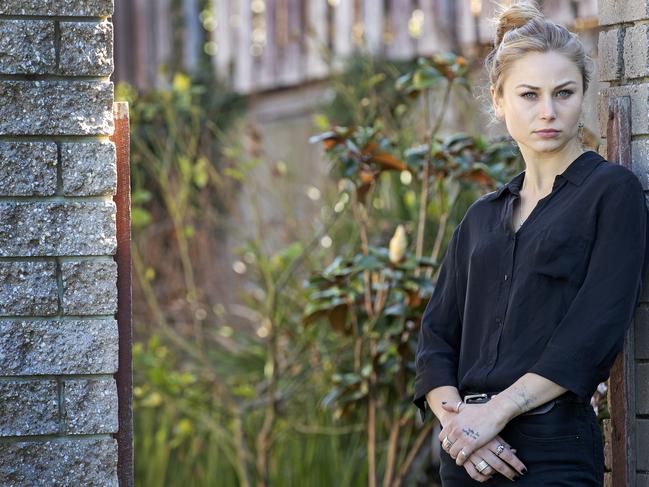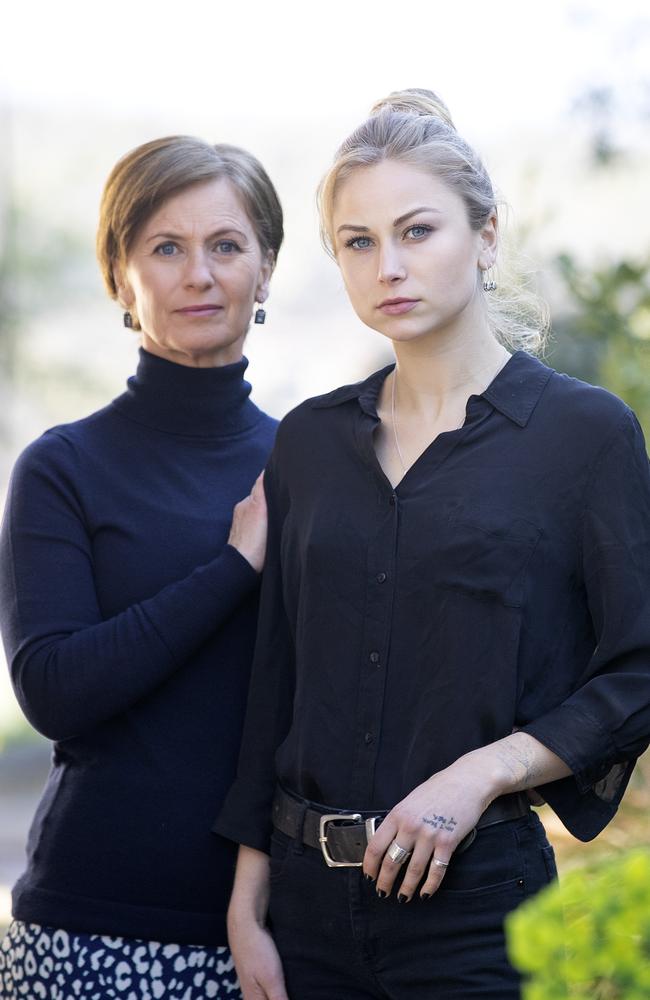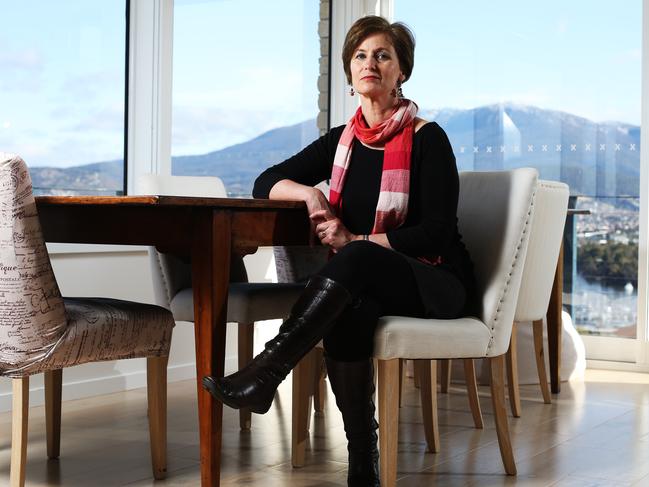Tasmania’s Government agrees to reform sexual abuse gag law by end of year
A sex abuse victim was finally able to tell her horrific story after a nine-year silence. But there is one word that still troubles her.
Last Monday, Grace Tame, spoke out publicly for the first time about the pedophilic abuse she suffered at the hands of her 58-year-old maths teacher when she was 15, at an elite private school in Hobart.
This followed a nine-year enforced silence, under Tasmania’s sexual assault gag laws, the last two years of which news.com.au had been working alongside Grace and her family, to help her cut through the legal red tape that kept her and other sexual abuse and rape survivors gagged in Tasmania.
RELATED: Grace can finally tell her story
RELATED: The long battle to tell her story
The process cost around $10,000, and after winning her fight in the Supreme Court of Tasmania, Grace became the first female sexual abuse survivor in Tasmania to legally win her right to self identify, which she did last week.
Now in response to her story and the news.com.au #LetHerSpeak campaign, the Tasmanian Government has said it will work to reform the gag law by the end of the year.
“The Government is specifically reviewing Section 194K of the Criminal Code” said a Government spokesman.
“We’ve already received more than 50 submissions from legal organisations, community organisations and the wider public.”
It is understood that Government would like to see the reforms in place before Christmas.

Tasmania’s Attorney-General, Elise Archer, has also personally commented on Grace’s case to praise the 24-year-old.
“It takes immense courage for survivors to speak about their experience, and I applaud the bravery shown by Grace Tame and her family,” said Ms Archer.
“Ms Tame’s experience is an example of why the Government has committed to investigating changes in this area.”
Grace says she is delighted that the Government intends to reform the gag law and has been overwhelmed by the outpouring of public support.
“I’ve been blown away by all the love I’ve felt from so many people. It shows that when we work together as a community, we can change things for victims and their families,” she said.

THE FOUR WORDS OFFENDING ABUSE VICTIMS
In addition to highlighting Tasmania’s archaic gag laws, Grace’s story has also highlighted a second sexual assault law urgently requiring overhaul.
In Tasmania, paedophiles who sexually abuse and molest children are charged under a euphemistically named law, called “maintaining a sexual relationship with a person under the age of 17”.
But Grace says that this wording waters down the seriousness of the crime, while also implying a level of consent.
“This was not a relationship. This was an insidious and calculated crime committed by an evil man who spent months grooming me,” says Grace.
“The name of the offence is not at all indicative of the gravity or reality of the crime, as it implies consent.”
In various other jurisdictions the equivalent charge is “the persistent sexual abuse of a child”.
Grace’s mother, Penny Plaschke, has also criticised the wording of Tasmania’s “maintaining a sexual relationship” law.
“The scars of self-harm on my daughter’s body attest to persistent sexual abuse, not a sexual relationship. We must not sanitise what occurred.”
Bester was found to have committed between 20 and 30 acts of “sexual intercourse” with the child, yet at sentencing in August 2011, the judge, Justice Helen Wood referred to the abuse as a “sexual relationship”.
Headlines at the time also minimised and romanticised the abuse, by suggesting a level of consent.
Examples include: “Court told of teacher’s tryst with teen”; “Teacher admits to affair with student”, “shamed teacher admits sex with Collegiate girl” and even “She wanted it”.
Jane Gilmore — the creator of the #FixedIt hashtag- says that words like “tryst” and “affair” excuse the violence and minimise the heinous nature of the crime.
“Children, by definition, cannot have sex with adults. It’s not sex, it’s rape,” says Gilmore,
“And it’s not a ‘relationship’: a relationship implies mutually consenting parties.”
In her new book Fixed It: Violence and the Representation of Women in the Media, Gilmore argues that the legal language which sanitises sexual assault serves to obstruct the public’s understanding of the events.
“Creating euphemisms for rape and abuse significantly softens the understanding of it and changes the way we think about raping children,” she said.
“The expression ‘raping children’ might be shocking to some people, but, that’s precisely the point.
“Yes, it is shocking but it should be shocking. It is a shocking crime and it should knock us back.”

A SECOND SURVIVOR BACKS CALLS FOR REFORM
Sexual abuse survivor Steve Fisher has also backed calls made by Grace, End Rape On Campus Australia and Laurel House sexual assault support service in Tasmania, to reform the law.
Between the ages of 12 and 15, Steve was sexually abused by Garth Stephen Hawkins, a former Anglican Rector in the parish of East Devonport in Tasmania. The abuse continued between 1979 and 1983.
When the paedophile was eventually arrested and convicted, he was found to have committed sexual offences against at least seven boys between 1974 and 1984.
But Steve says the name of the law that Hawkins was charged under — “maintaining a sexual relationship with a person under the age of 17” — only exacerbated Steve’s own trauma.
“It makes it sound like you’re having a relationship, like you’re having an affair. It’s creepy. It gave me the creeps. It doesn’t let you identify exactly what the crime is,” he said
“It really upset me and it upset a lot of other victims too. It suggests that, except for the fact that one person was under age, it was otherwise an entirely consensual mutual relationship.”
Steve says that a child does not ‘date’ a paedophile, as the language suggests.
“It’s abuse and we need to call it abuse. The word ‘relationship’ also minimises what happened in other people’s eyes. It’s a further psychological assault.”
“It certainly needs changing and in the future we will certainly be supporting when it comes before parliament. I hate that expression.”
THE TIME IS NOW
Documents obtained by news.com.au show that this is not the first time Grace’s family have tried to have this issue addressed.
In March 2017, Penny wrote to the previous Tasmanian Attorney-General, urging a change to the name of the law, but she was rebuffed by the Acting Attorney-General, Mathew Groom in May that year, who responded saying that there was “no plan to rename this crime”.
The letter which has been seen by news.com.au, states that the Tasmanian Law Reform Institute (TLRI) and Tasmania’s Sentencing Advisory Council (SAC) have both recommended against changing the name of the crime as doing so may “discourage or even reduce the rate of pleas of guilty for the crime”, meaning that victims were required to give evidence.
But Sharna Bremner, the founder of End Rape On Campus Australia, says that this thinking is illogical and misguided.
“Yes, it’s true that giving evidence can be re-traumatising for many victims, but watering down the name of an offence is not the correct answer,” she said.
“If court is re-traumatising for victims, then address that as an issue, by changing community attitudes and support for victims. Don’t just soften the charge to make it easier on offenders. That’s counterintuitive and illogical. You’re managing a symptom rather than addressing the cause”.

TASMANIA’S ATTORNEY-GENERAL RESPONDS
While the former Attorney-General’s office previously rebuffed calls from Grace’s family to change the law, the current Attorney-General, Elise Archer, has agreed to now review the law.
“I am personally concerned about this,” said Ms Archer.
“[We are] committed to investigating changes in this area both in terms of reform of section 194K and the crime of ‘maintaining a sexual relationship with a young person’.”
Ms Archer again praised Grace for her bravery and courage in speaking out.
Chris Gunson, the former head of Tasmania’s Bar Association, has also thrown his weight behind Grace, agreeing the law should be overhauled.
“The current crime wrongly implies some fault or the abused child being in a ‘voluntary relationship’ with the perpetrator,” said Mr Gunson.
Professor Ben Mathews, who is currently completing the first national study of child maltreatment out of Queensland University of Technology says that the proposed amendment to rename the offence the ‘persistent sexual abuse of a child’ is “completely consistent with any coherent theoretical, legal and ethical analysis of the proper nature of child sexual abuse and its clear distinction from any form of genuinely consensual relationship.”

Nina Funnell is a Walkley Award winning journalist and a director of End Rape On Campus Australia. She is the creator of the #LetHerSpeak campaign for law reform and has worked with Ms Tame and her family for the past two years.
